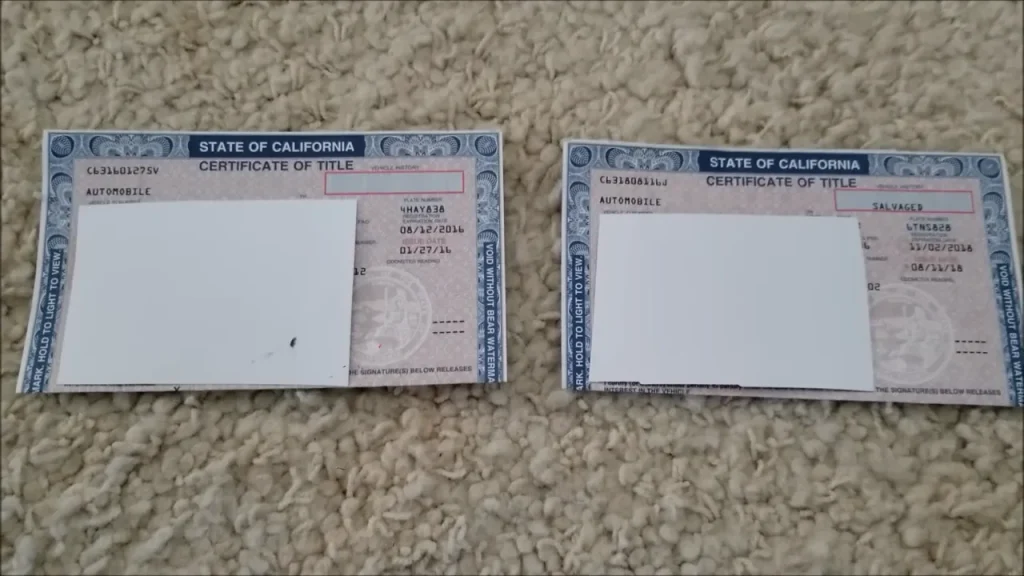Can I Sue Someone For Title Jumping? (Legal Answers)
Yes, you may have legal grounds to sue someone for title jumping, also known as skipping or skipping titles. Title jumping occurs when a vehicle seller fails to transfer the title to the buyer properly. This can lead to legal and financial consequences for the buyer. Consult with a legal professional to assess your specific situation and determine the best course of action.
What Is Title Jumping?
Title jumping, also known as skipping titles or floating titles, refers to the practice of a vehicle seller transferring ownership to a buyer without registering the change of ownership with the appropriate authorities. In the context of selling a car, this typically involves skipping the step of officially transferring the title of the vehicle into the buyer’s name.
Title jumping can have legal and financial implications for both the buyer and the seller. When a seller engages in title jumping, they may avoid paying taxes or fees associated with the transfer of ownership, and the buyer may face difficulties in obtaining proper registration and ownership documentation for the vehicle.
It’s important for both parties involved in a vehicle transaction to follow the proper procedures for transferring the title to ensure a legal and valid transfer of ownership. If title jumping is discovered, it can lead to legal consequences and complications in the future.
What Is a Bonded Title?
A bonded title, also known as a surety bond title or bonded certificate of title, is a specialized type of vehicle title issued under circumstances where the standard process of obtaining a title faces challenges.
This situation often arises when there are issues with the vehicle’s ownership history or when the required documentation to establish ownership is incomplete or missing. In such cases, the vehicle owner may be required to purchase a surety bond, which serves as a form of insurance.
This bond provides financial protection to legitimate prior owners or lienholders in case their rightful claims to the vehicle are proven valid in the future. The owner then applies for a bonded title, submitting the bond along with any necessary documents and fees to the appropriate state or local authorities.
There is typically a waiting period during which potential claimants can come forward. If no valid claims are made during this period, a bonded title is issued to the owner. After a specified time and with no legitimate claims, the bonded title may be converted into a regular title, providing a clear and marketable title for the vehicle’s current owner.
The specific requirements and procedures for obtaining a bonded title can vary by jurisdiction, so individuals seeking such titles should adhere to the guidelines set forth by their local or state authorities.
The Problem of Title Jumping for the Seller
Title jumping poses significant problems for the seller in a vehicle transaction. Title jumping occurs when a seller neglects to officially transfer the title of a vehicle to the buyer, circumventing the proper legal procedures.
One immediate consequence for the seller is the potential legal liability, as they remain officially registered as the owner of the vehicle. If the new owner engages in illegal activities, is involved in an accident, or fails to register the vehicle properly, the seller could face legal repercussions and financial liabilities.
Moreover, title jumping may be seen as an attempt to evade taxes and fees associated with the transfer of ownership, leading to potential legal consequences. Sellers are strongly advised to adhere to proper title transfer procedures to ensure a clear transfer of ownership, mitigate legal risks, and uphold ethical and legal responsibilities in the vehicle selling process.
The Problem of Title Jumping for the Buyer
Title jumping poses significant problems for the buyer in a vehicle transaction. When a seller engages in title jumping by neglecting to transfer the title officially, the buyer may encounter numerous challenges.
Firstly, the buyer may struggle to register the vehicle in their name, as the title, a crucial legal document, remains under the seller’s name. This can lead to complications in obtaining proper vehicle registration, which is essential for lawful ownership and operation.
Additionally, title jumping may signal potential issues with the vehicle’s history, as a legitimate title transfer would include important information about the vehicle’s condition, liens, or other pertinent details.
Moreover, if the seller’s actions are perceived as an attempt to evade taxes or fees, the buyer could be implicated in such unlawful practices. To avoid these complications, buyers should insist on a proper title transfer process, ensuring that the seller completes all necessary documentation and legal steps to facilitate a seamless and lawful change of ownership.

What Happens If You Buy a Title Jumped Vehicle?
If you unknowingly buy a title-jumped vehicle, you may encounter various legal and administrative challenges. Title jumping often indicates that the seller failed to officially transfer the vehicle’s title, leaving you with an improperly documented ownership status.
This can complicate the process of obtaining proper registration for the vehicle in your name. You might face difficulties in proving legal ownership, potentially leading to legal consequences or fines. Furthermore, title jumping could be a red flag for undisclosed issues with the vehicle’s history, such as outstanding liens or prior damage, as a legitimate title transfer typically includes these details.
To avoid these complications, it’s crucial to conduct thorough due diligence before purchasing a vehicle, ensuring that the title transfer process is complete and legal. If you discover that you’ve bought a title-jumped vehicle, consulting with legal professionals and the relevant authorities is advisable to navigate the situation and take the necessary steps to rectify the title status.
The Difference Between Title Jumping and Title Skipping
“Title jumping” and “title skipping” are terms often used interchangeably, but they can have subtle differences in meaning. Both involve the improper transfer of a vehicle’s title, but the context and implications may vary.
Title Jumping
- Title jumping typically refers to the practice of a vehicle seller avoiding the proper transfer of the title to the buyer.
- This can involve a seller failing to transfer the title into their name before selling the vehicle, or transferring it directly from the previous owner to the subsequent buyer without registering the change of ownership in their name.
- Sellers might engage in title jumping to evade taxes, fees, or other legal obligations associated with a formal title transfer.
Title Skipping
- Title skipping is a broader term that can encompass various irregularities in the chain of title transfers.
- It may involve skipping one or more steps in the proper transfer of ownership, including bypassing necessary paperwork or neglecting to register the change of ownership with the relevant authorities.
- Title skipping may also refer to situations where a vehicle’s title history has gaps or inconsistencies due to incomplete or improper transfers in the past.
Why Do People Jump Or Skip Car Titles?
People may engage in the practice of jumping or skipping car titles for various reasons, often driven by a desire to avoid legal obligations, financial responsibilities, or regulatory requirements. One primary motivation is the attempt to evade taxes and fees associated with the proper transfer of a vehicle’s title.
By skipping the formal title transfer process, sellers may believe they can avoid paying applicable taxes or registration fees. Additionally, individuals might engage in title jumping to conceal undisclosed issues with the vehicle, such as outstanding liens, salvage status, or a questionable history. However, these actions pose significant risks for both buyers and sellers, including legal consequences, difficulties in establishing ownership, and potential financial liabilities.
It is essential for all parties involved in a vehicle transaction to adhere to the proper legal procedures to ensure a transparent and lawful transfer of ownership, protecting the interests and rights of both buyers and sellers in the process.
Can You Go to Jail for Title Jumping?
Title jumping, also known as skipping titles, is an illegal practice, and engaging in it can lead to serious consequences, including potential criminal charges. While the specific penalties vary by jurisdiction, individuals involved in title jumping may face criminal charges such as fraud, tax evasion, or providing false information. Jail time is a possible outcome, especially if the act is deemed intentional or part of a broader pattern of fraudulent behavior.
In addition to criminal charges, title jumping can result in civil liabilities. Sellers who title jump may be held responsible for any financial losses or damages incurred by the buyer or other parties affected by the improper transfer of the vehicle.
It’s important for individuals involved in vehicle transactions to adhere to the legal requirements for title transfers in their respective jurisdictions. If you are unsure about the proper procedures or have concerns about the title history of a vehicle, it is advisable to consult with legal professionals or relevant authorities to ensure a lawful and transparent transfer of ownership.

What If You Are the Victim of Title Jumping
If you are the victim of title jumping, meaning you’ve purchased a vehicle with an improperly transferred title, there are several steps you can take to address the situation:
- Document the Situation: Keep all relevant documents related to the vehicle purchase, including the bill of sale, any communication with the seller, and the title.
- Contact the Seller: Reach out to the seller to discuss the issue. It’s possible that the title jumping was unintentional or a result of misinformation.
- Consult Legal Advice: Seek advice from legal professionals who specialize in vehicle transactions. They can provide guidance on the specific laws and regulations in your jurisdiction and advise you on the best course of action.
- Contact the Department of Motor Vehicles (DMV) or Equivalent Agency: Report the title jumping to the DMV or the equivalent agency in your area. They may provide guidance on how to rectify the situation and ensure proper title transfer.
- Consider Legal Action: If necessary, you may need to consider legal action against the seller to recover any financial losses or address the consequences of the title jumping.
- Obtain a Bonded Title: In some cases, you may need to apply for a bonded title to establish legal ownership. This involves purchasing a surety bond to compensate any legitimate prior owner or lienholder if their interest is proven valid.
- Learn from the Experience: Use the experience to be more cautious in future vehicle transactions. Conduct thorough research on the vehicle’s title history, and consider obtaining a vehicle history report before making a purchase.
Is title jumping a felony in CA?
The legal consequences for title jumping, including whether it is classified as a felony or misdemeanor, can vary by state, and it’s important to check the most recent laws for accurate information. In California, title jumping, also known as fraudulent title transfers, is generally considered a serious offense, and it can lead to criminal and civil penalties.
Title-related offenses in California are typically addressed under the California Vehicle Code. Engaging in fraudulent practices related to title transfers can result in criminal charges, including potential felony charges, depending on the circumstances and the extent of the fraud.
For the most current and accurate information regarding the legal status of title jumping in California, it is advisable to consult with legal professionals or check with the California Department of Motor Vehicles (DMV) for the latest laws and regulations pertaining to vehicle title transfers and related offenses. Laws can change, and it’s crucial to be aware of the current legal landscape.
Is title jumping illegal in Florida?
Title jumping, which involves the improper transfer of a vehicle title, is generally considered illegal in most states, including Florida. Title jumping can lead to legal consequences, including potential criminal charges and civil liabilities.
In Florida, engaging in fraudulent practices related to vehicle title transfers may be addressed under the state’s laws and regulations governing motor vehicles. It’s essential to adhere to proper procedures for title transfers to ensure a lawful and transparent change of ownership.
For the most up-to-date and accurate information on the legal status of title jumping in Florida, it is recommended to consult legal professionals or check with the Florida Department of Highway Safety and Motor Vehicles (DHSMV). They can provide information on the specific laws and regulations related to vehicle title transfers and associated offenses in the state of Florida. Laws can change, and it’s important to stay informed about the current legal landscape.
FAQ:
1. Can I sue someone for title jumping?
Yes, you may have legal grounds to sue someone for title jumping, as it is an illegal practice that can lead to various consequences.
2. What is title jumping?
Title jumping, also known as skipping titles, occurs when a vehicle seller fails to properly transfer the title to the buyer, bypassing the official procedures for ownership transfer.
3. What are the consequences of title jumping for the buyer?
Buyers of title-jumped vehicles may face difficulties in obtaining proper registration, legal ownership disputes, and potential legal and financial liabilities.
4. How can I prove title jumping occurred?
Document the transaction with the bill of sale, communication with the seller, and any evidence of improper title transfer. Consult legal professionals for guidance.
5. Can title jumping lead to criminal charges?
Yes, title jumping can result in criminal charges, including fraud, tax evasion, or providing false information, depending on the jurisdiction.
6. What steps should I take if I discover title jumping after a purchase?
Contact the seller, document the situation, seek legal advice, report to the Department of Motor Vehicles (DMV), and consider legal action if necessary.
7. Can I recover financial losses if I am a victim of title jumping?
You may pursue legal action against the seller to recover financial losses resulting from title jumping, but the outcome depends on the specific circumstances and applicable laws.
8. How can I avoid buying a title-jumped vehicle?
Conduct thorough research on the vehicle’s title history, obtain a vehicle history report, and ensure the seller completes all necessary documentation for a proper title transfer.
9. Is title jumping treated as a felony in all states?
The classification of title jumping as a felony or misdemeanor varies by state. Check your state’s laws or consult legal professionals for specific information.
10. Can I convert a title-jumped vehicle’s title to a regular title?
In some cases, you may need to apply for a bonded title, providing a surety bond to compensate legitimate prior owners. After a waiting period, it may be converted to a regular title if no valid claims arise.
